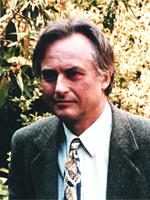The Prizewinner 1997

| Name | Richard Dawkins |
|---|---|
| Born on | 26 March 1941 |
| Nationality | United Kingdom |
| Title | Professor, the Public Understanding of Science, University of Oxford |
Reason for Awarding
Professor Dawkins has had a tremendous impact on our view of the world and is already well known internationally through the 1976 publication of his book, “The Selfish Gene.” Professor Dawkins himself has stated that the term selfish gene is merely a catchy phrase. He followed up this book with The Extended Phenotype, The Blind Watchmaker and River Out of Eden through which Professor Dawkins tries to show us that all living things on Earth appear, exist and advance as a result of an endless battle of genes. This entirely new perspective challenges our concept of harmony with the natural world and totally reverses our understanding and perception of the world.
When we think of coexistence between people and the natural world, we take it for granted that some form of harmony exists in nature. Thus, if we can find a way to coexist with nature without disturbing that harmony, we have done our job. However, as Professor Dawkins sees it, the natural world is one of endless battles, and it progresses only as a result of those battles. This perspective compels us to essentially switch our fundamental views. How we view and perceive nature determines the path that we will take.
Whereas the basis for Professor Dawkins' theory is built upon numerous biological facts brought to light in recent years, it is nevertheless a bold hypothesis. While the theory lays the foundation for coexistence between humans and nature, the viewpoint advocated by Professor Dawkins also holds tremendous significance for the International Cosmos Prize whose goal is to create new values that lay the foundations for the next generation.
The fifth awarding of the International Cosmos Prize today begs the question of whether we are searching at a basic enough level, as Professor Dawkins has done.
It is that spirit that led us to believe that Professor Dawkins is the most fitting person for this year's International Cosmos Prize.
CURRICULUM VITAE
| 1959 - 1962 | Balliol College, University of Oxford |
| 1962 - 1966 | Research Student, Oxford University (D.Phil.,1966) |
| 1965 - 1967 | Research Assistant to Professor N. Tinbergen FRS |
| 1967 - 1969 | Assistant Professor of Zoology, University of California, Berkeley |
| 1969 - 1970 | Senior Research Officer, Department of Zoology, Oxford |
| 1970 - 1990 | University Lecturer in Zoology, and Fellow of New College, Oxford |
| 1989 | D.Sc. (University of Oxford) |
| 1990 - 1995 | Ad Hominem Reader in Zoology, University of Oxford |
| 1995 - | Charles Simonyi Reader in the Public Understanding of Science, and Professional Fellow of New College |
Honors
| 1987 | Royal Society of Literature Award for The Blind Watchmaker |
| 1987 | Los Angels Times Literary Prize, for The Blind Watchmaker |
| 1987 | Sci. Tech Prize for Best Television Documentary Science Programme of the year, for BBC Horizon Programme: The Blind Watchmaker |
| 1988 | Honorary Fellowship, Regent's College, London |
| 1989 | Zoological Society of London Silver Medal |
| 1990 | Royal Society of London, Michael Faraday Award |
| 1994 | Nakayama Prize for Achievement in Human Science |
| 1995 | Honorary Doctor of Letters, St.Andrews University |
| 1996 | Honorary Doctor of Letters, Australian National University, Canberra |
| 1997 | Elected Fellow of the Royal Society of Literature |
Books
| 1976 | The Selfish Gene. Oxford and New York: Oxford University Press. Second Edition with extensive additions published 1989 |
| 1982 | The Extended Phenotype. Oxford and San Francisco: W. H. Freeman. |
| 1986 | The Blind Watchmaker. Longman, Harlow and W. W. Norton, New York |
| 1995 | River Out of Eden: A Darwinian View of Life. New York: Basic Books; London: Weidenfeld |
| 1996 | Climbing Mount Improbable. London: Viking Penguin; New York: W. W. Norton |
 |
As the last chapter of climbing Mount Improbable suggests, Dr. Dawkins is fascinated by the intricate coevolutionary world of the fig tree. Here he tries to get a closer look by climbing a fig tree in Mauritius,1992. |
|---|---|
 |
A traditional Oxford pastime. Punting on the River Cherwell. |
 |
In 1991, Dr. Dawkins was invited to give the annual Royal Institution Christmas Lectures for Children, in London. His five lectures, under the title 'Growing Up in the Universe', were televised by the BBC. As is now traditional, in the following summer he repeated the lectures in Japan, giving them separately in Tokyo and Sendai. Here is he seen preparing a computer demonstration before the audience arrives in the lecture theatre in Sendai. |
 |
Receiving an honorary D. Litt., University of St. Andrews, Scotland, 1995. |
